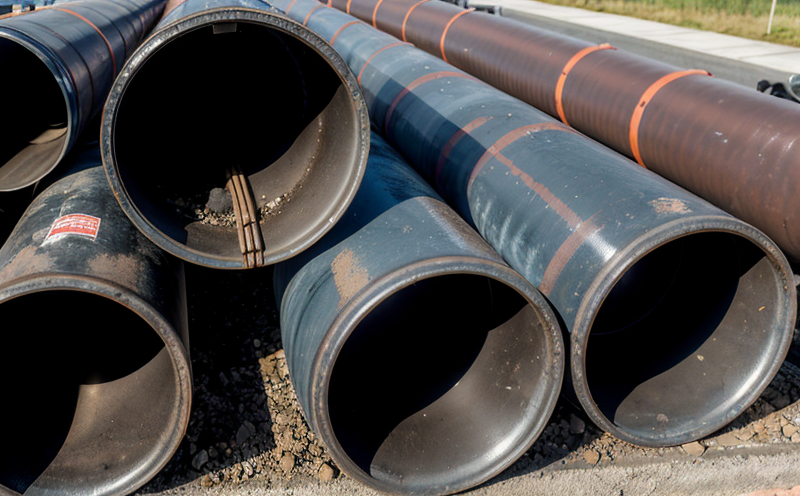JIS K 6776 Flexural Testing of Plastic Pipes
The JIS K 6776 flexural testing method is a standardized procedure used to evaluate the bending strength and flexibility of plastic pipes. This test is crucial for ensuring that plastic pipes meet specific performance requirements under stress conditions, which is essential in various sectors such as construction, plumbing, and industrial piping.
The process involves subjecting samples cut from the pipe to carefully controlled bending until they fracture or reach a specified deflection point. The flexural strength, modulus of elasticity, and yield strength are derived from this testing. Flexural tests provide valuable insights into how pipes will perform under real-world loading conditions, helping manufacturers ensure product quality and safety.
The JIS K 6776 method is widely used in Japan but is also recognized internationally due to its stringent standards. It ensures that plastic pipes can withstand the rigors of installation without compromising structural integrity or durability over time. The test helps identify any weaknesses in design, material selection, or manufacturing processes.
For accurate results, it's important to follow strict procedures. Specimens are cut from the pipe according to specified dimensions and thickness. They are then conditioned at a controlled temperature and humidity level before testing begins. During testing, precise control over loading speed and applied force is critical to obtain reliable data.
The test setup typically includes a universal testing machine equipped with appropriate fixtures for holding the specimens securely while applying bending moments. High precision strain gauges or displacement sensors may also be used to measure deformations accurately. Once broken, the maximum load at fracture and the deflection at specified loads are recorded.
Understanding these parameters allows manufacturers to make informed decisions about improving their products' performance characteristics. By adhering strictly to JIS K 6776 standards, companies demonstrate commitment to quality control and customer satisfaction.
In summary, flexural testing under JIS K 6776 ensures that plastic pipes meet rigorous mechanical property requirements essential for reliable service life and safety compliance across different industries.
Why It Matters
The importance of flexural testing cannot be overstated when it comes to ensuring the integrity and longevity of plastic pipes used in critical applications. Flexural strength is a key indicator of how well a material can resist bending without breaking, which directly impacts its suitability for use.
In construction projects involving extensive piping systems, flexibility plays a crucial role in accommodating movement due to temperature changes or structural settlements. A pipe with insufficient flexural strength could crack under these conditions, leading to leaks or failures that are expensive and time-consuming to repair.
Similarly, in the plumbing industry, where pipes may need to bend around corners or adapt to uneven ground surfaces, ensuring adequate flexibility prevents damage during installation and subsequent use. This not only enhances safety but also reduces maintenance costs over the long term.
For industrial applications such as chemical transport, where higher pressure levels are involved, flexural testing helps guarantee that pipes won't fail prematurely due to stress concentrations or fatigue cracks forming at bends. Such failures could result in hazardous leaks of harmful substances into the environment, posing significant risks to both personnel and ecosystems.
In summary, flexural testing under JIS K 6776 is indispensable for verifying that plastic pipes possess sufficient resilience against bending forces encountered throughout their lifecycle. This ensures reliability, enhances safety, and supports sustainable practices by reducing waste from defective products entering the market.
Industry Applications
- Construction: Ensuring structural integrity of underground drainage systems.
- Plumbing: Verifying proper installation around bends and corners.
- Industrial Piping: Guaranteeing safe transport of chemicals under pressure.
- Automotive: Evaluating fuel lines' flexibility for optimal performance.
EuroLab offers comprehensive JIS K 6776 flexural testing services, leveraging advanced equipment and experienced technicians to deliver precise results. Our state-of-the-art facilities provide a controlled environment where samples can be prepared according to exacting specifications.
We utilize sophisticated universal testing machines capable of applying consistent loads at predetermined rates, ensuring accurate measurements regardless of sample size or shape variations. Strain gauges and displacement sensors further enhance data accuracy by monitoring deformations during the test process.
Our team comprises experts familiar with all aspects of JIS K 6776 compliance, from specimen preparation to final report generation. They work closely with clients to understand unique requirements and provide tailored recommendations based on test outcomes.
In addition to testing services, EuroLab also offers consultation on improving product designs through better material choices or optimized structural configurations. By leveraging our expertise, manufacturers can enhance their competitive edge by delivering superior quality products compliant with global standards like JIS K 6776.





